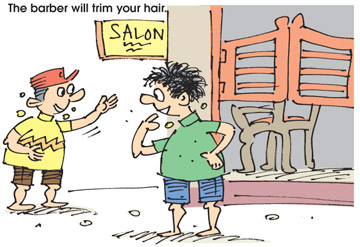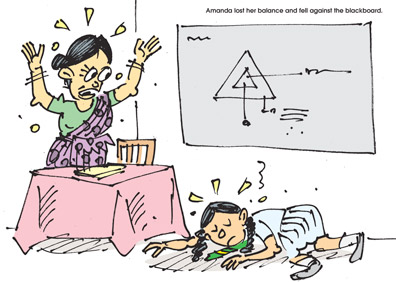
by R. S. Karunaratne
simple future tense
The simple future tense is formed using shall for I and we. However,
today it is more common to use will for both nouns and pronouns.
We use the simple future tense to refer to actions that will happen
in the future.
 I will reach Kandy tonight. I will reach Kandy tonight.
Father will make a kennel for our pet dog.
The barber will trim your hair.
The Lions' Club will distribute dry rations for the flood victims.
She'll finish typing the report tomorrow.
We use the simple future tense with will to make predictions.
There will be thunder showers in the evening. The board of directors
will approve your appointment.
The balloon will burst if you blow it too much.
In times to come there will be a severe shortage of drinking water.
Newspapers will survive even in the next millennium.
We use the simple future tense with will to refer to something which
we decide to do at the time of speaking.
A: What are you doing this evening?
B: I will finish some assignments.
If you come late, you will miss the first part of the film.
Please wait here. I'll go upstairs and bring your book.
Rex will get a shock when he attends the surprise farewell party.
"This drug will cure you," the doctor said.
We use the going to form for actions we have already planned for the
future.
The university is going to hold the convocation next month. Namali is
going to perform well in the forthcoming examination.
The rise in the price of petrol is going to cause endless problems
for ordinary people. If the rains continue, the river is going to burst
its banks.
The country's future is going to be brighter next year.
We use the going to form when we are talking about future events that
have some present reality. We're going to buy a new car.
The landlord is going to increase the rent at the end of this month.
The management is going to give me a raise.
The principal is going to address the assembly.
The teacher is going to question him. Common errors
 Don't say: The phone is ringing. I'm going to answer it. Don't say: The phone is ringing. I'm going to answer it.
Say: The phone is ringing. I'll answer it.
Don't say: I think I'm going to bed.
Say: I think I'll go to bed.
Don't say: The doorbell is ringing. I go.
Say: The doorbell is ringing. I'll go.
Don't say: I'm going to stop smoking.
Say: I will stop smoking.
Don't say: I promise I don't smoke again.
Say: I promise I won't smoke again.
We use shall I / shall we to ask for instructions, to offer services
and to make suggestions.
Shall I open the door?
Shall I come with you?
What time shall we meet?
Shall we go for a show?
Shall we dance?
We use will to give instructions and orders.
Will you get me a money order form?
Make me a cup of tea, will you?
Will you be punctual, please.
Quiz on suffixes
A suffix is a group of letters at the end of a word which changes the
word’s meaning. Add the following suffixes to the words given below and
check your answers with the key.
Suffixes with their meanings
able / ible : able to be
age: the action described by the verb
aholic / oholic : a person who is unable to stop doing or taking
something
al : relating to
an / ian: a person who does something
ance / ence / ancy / ency : an action, state or quality
ation / ion : the process of the action described by the verb
centric : having the stated thing as your main interest
ed: having this thing or quality
ee: someone that something is done to
en: to become or make something become
er / or : the person or thing that does the activity.
Activity
1. Dance ...........
2. Employ ...........
3. Act ...........
4. Cook ...........
5. Soft ...........
6. Fat ...........
7. Thick ...........
8. Interview ...........
9. Train ...........
10. Employ ...........
11. Beard ...........
12. Colour ...........
13. Explain ...........
14. Connect ...........
15. Educate ...........
16. Perform ...........
17. Prefer ...........
18. History ...........
19. Approve ...........
20. Culture ...........
Quiz on Suffixes
1. Dancer
2. employer
3. actor
4. cooker
5. soften
6. fatten
7. thicken
8. interviewee
9. trainee
10. employee
11. bearded
12. coloured
13. explanation
14. connection
15. education
16. performance
17. preference
18. historian
19. appr
Use of prepositions
Part 7
The number of prepositions in English is relatively small compared to
the vast number of nouns, adjectives and verbs used in the language.
Most sentences we produce have at least one preposition. Therefore, we
have to know how to use prepositions correctly.
Aboard
When you are aboard a ship, aircraft or spacecraft, you are in it or
on it. Queen Elizabeth visited the island aboard a luxury liner.
We have clear the luggage now aboard a plane.
Scientists are carrying out experiments aboard the Russian space
shuttle.
Passengers should be aware of safety measures available aboard an
aircraft. The plane crashed killing all the passengers aboard.
Against
 If something is pressing against something else, it is touching it. If something is pressing against something else, it is touching it.
I saw Bradman leaning against a wall.
The beggar sat there propped up against the door.
Amanda lost her balance and fell against the blackboard.
The rain splashed against the window.
If you take some action against somebody, you try to harm him.
The workers will rally against the new manager.
The following verbs are usually followed by the preposition against.
agitate, align, ally, compete, conspire, fight, play, plot, side
Similarly, some nouns are usually followed by the preposition
against. Aggression, ally, battle, blasphemy, boycott, conspiracy,
crime, fight, match, sanctions, victory, war If you take action against
something, you try to end it. The police are taking action against
drivers who flout road rules. The minister is trying to protect
consumers against black marketeers. The Health Ministry has warned
against smoking. The following verbs are usually followed by the
preposition against. advise, counsel, fight, guard, immunize, inoculate,
insulate, insure, militate, protect, vaccinate, warn Similarly, the
following nouns are usually followed by the preposition against. battle,
blow, campaign, defence, fight, insurance, shield, war
When we are against something, we think it is bad.
We are against smoking.
People are protesting against the escalating prices of vegetables.
The opposition is campaigning against the new appointments.
Most of them vote against the death penalty.
When there is evidence against somebody, he has done something wrong.
There is evidence against the killer.
If you do something against the law, you are committing an offence.
It is against the law to clear crown land without a permit.
To be continued
Forming adjectives from nouns
Words often come in families. You can expand your vocabulary by
becoming familiar with these word families and this can also enable you
to become a more fluent speaker and writer of English. Write the
relevant adjective for each of the nouns listed in column ‘A’ and check
your answers with the key.
Column A Column B
1. Ability ...............
2. Acceptance ...............
3. Accident ...............
4. Accuracy ...............
5. Accusation ...............
6. Achievement ...............
7. Act ...............
8. Activity ...............
9. Addition ...............
10. Admiration ...............
11. Advantage ...............
12. Advice ...............
13. Agreement ...............
14. Aim ...............
15. Amazement ...............
16. Anger ...............
17. Announcement ...............
18. Application ...............
19. Appreciation ...............
20. Approval ...............
21. Approximation ...............
22. Argument ...............
23. Art ...............
24. Attention ...............
25. Attraction ...............
26. Authority ...............
27. Availability ...............
28. Avoidance ...............
29. Awareness ...............
30. Base ...............
Key
1. able
2. acceptable
3. accidental
4. accurate
5. accusing
6. achievable
7. acting
8. active
9. additional
10. admirable
11. advantageous
12. advisable
13. agreeable
14. aimless
15. amazing
16. angry
17. unannounced
18. applicable
19. appreciable
20. approving
21. approximate
22. arguable
23. artistic
24. attentive
25. attractive
26. authoritative
27. available
28. avoidable
29. aware
30. baseless |



